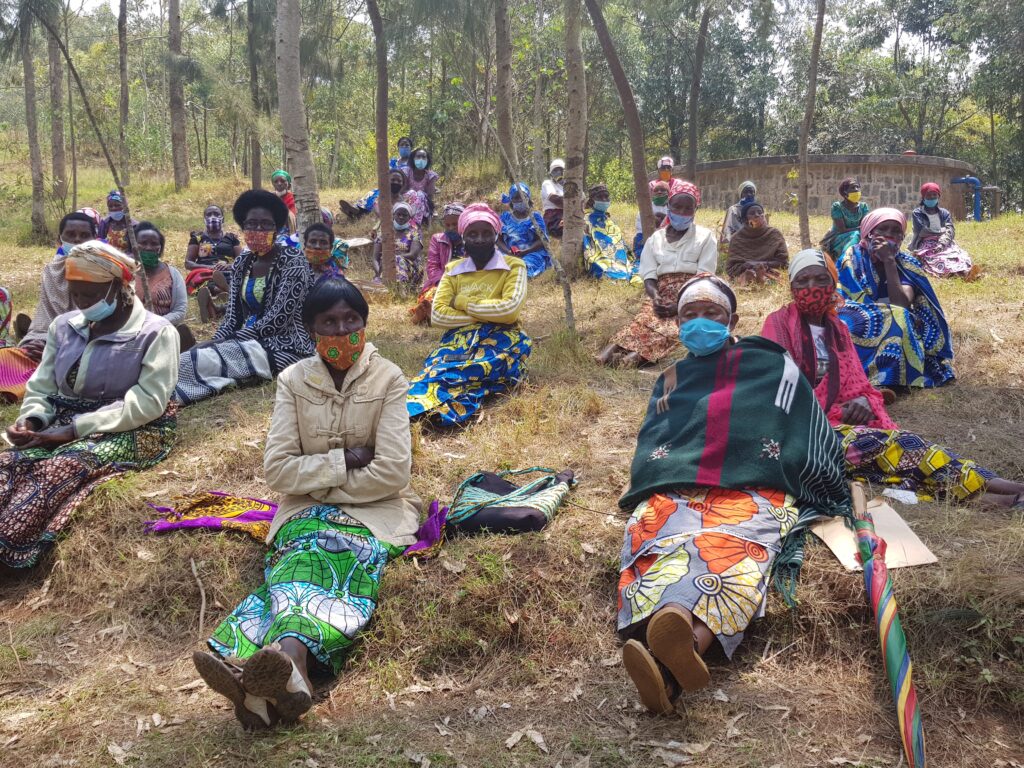
Continuing our series of articles from our Annual Report 2021/22, we outline here our work on our Empowering Vulnerable Genocide Widows in Western Rwanda to Alleviate Extreme Poverty (EVWEP) Project.
The Empowering Vulnerable Genocide Widows in Western Rwanda to Alleviate Extreme Poverty (EVWEP) project is a partnership between Survivors Fund (SURF) and AVEGA Agahozo providing holistic support to widowed survivors of the genocide against the Tutsi in Rwanda and their dependents in the two districts of the Western Province, namely Rusizi and Nyamasheke. It was originally funded as a 30 month project from UK Aid Direct, the challenge fund of the UK Department for International Development (now part of the UK Foreign, Commonwealth & Development Office) supporting civil society organisations to achieve sustained poverty reduction.
EVWEP was initially scheduled to run through to March 2022 with the aim to empower 1,050 vulnerable genocide widows and 4,000 of their dependents by:
- Alleviating their poverty by ensuring they have the skills, resources and confidence to generate income.
- Reducing vulnerability, build confidence and improve the wellbeing by empowering participants to take greater control of their lives.
- Improving food security and sustainable energy for the most vulnerable.
Due to cuts in the Overseas Development Assistance of the UK Government, the project was closed prematurely in July 2021, but still we were able to support over 1,272 vulnerable genocide widows to access livelihood development training, psychosocial counselling and food security and sustainable energy measures, which in turn helped over 5,000 of their dependents.
An overall assessment of the project was conducted by the UK Aid Direct team and scored an A+ which translates into the outcomes delivered have exceeded expectation. The commentary we received on it:
The grant holder has demonstrated progress in key outcomes for 1,050 vulnerable genocide widows and their households, including improved food security and consumption, increased disposable household income, access to counselling and mental health support services, and more environmentally-friendly alternatives for cooking.
Of further note was the successful approach to train community volunteers as key project implementors for the project. SURF successfully considered the risks around this and has been able to demonstrate how this approach has led to greater community buy-in as well as stronger sustainability for the project. The grant holder also provided some useful learnings and future adaptations for implementation, especially around setting up IGA with loans from banks. A key point of consideration for the project team for the implementation going forward is to reflect on how to support those whose businesses are still not profitable and are therefore in debt to the bank.
Although this project has faced an array of challenges, the project team has been able to adapt commendably well – working in consultation with the government, the SURF team was able to resolve the main issue of field staff being able to reach beneficiaries. As a result of the impact of COVID-19, one of the safeguarding trainings for project staff was not able to happen – this is also an area which SURF are encouraged to prioritise a resolution for as the project proceeds with other funding.
Overall, despite these challenges, at the point of FCDO funding ending it seems evident that the project had made good progress towards key targets and seemed well placed to continue with an upward trajectory having laid much of the groundwork.
Julienne*
Julienne is one of the project participants. She is a genocide widow living in Kagano Sector of Nyamasheke District of Western Rwanda. Before joining the project, her daily living activity was subsistence farming which she did to earn an income to help her family, for which she had received no training previously. Julienne joined the project and attended the livelihoods training program with others living local to her for three months. After attending the training, she then started taking part in group savings. She then took a loan of RWF 200,000 (£144) from Urwego Bank to start her own business selling different items in the market. Before taking a loan, she used to generate an income of RWF 5-10,000 (£3.60 – £7.20) per month. However, things have changed where now her monthly profit is between RWF 30 – 50,000 (£22 – £36) which is enabling her to independently support her entire household.
Before joining EVWEP, Julienne had no hope for the future. She could not think about starting a small business. But now things have changed, and she is involved in a business.
“Today I am very happy for what I have achieved through this project. I lost my children and husband during the genocide against Tutsi in Rwanda. I lived a miserable life with trauma and its symptoms, but a counsellor visited me many times and helped me to join the business training after which I took a loan and started my business. I am able now earn up to RWF 50,000 (£36) per month. I finished repaying back the loan and I am ready to apply for a second round of funding to scale up my business in the market. Thank you so much for playing an important role in rebuilding my life.”
